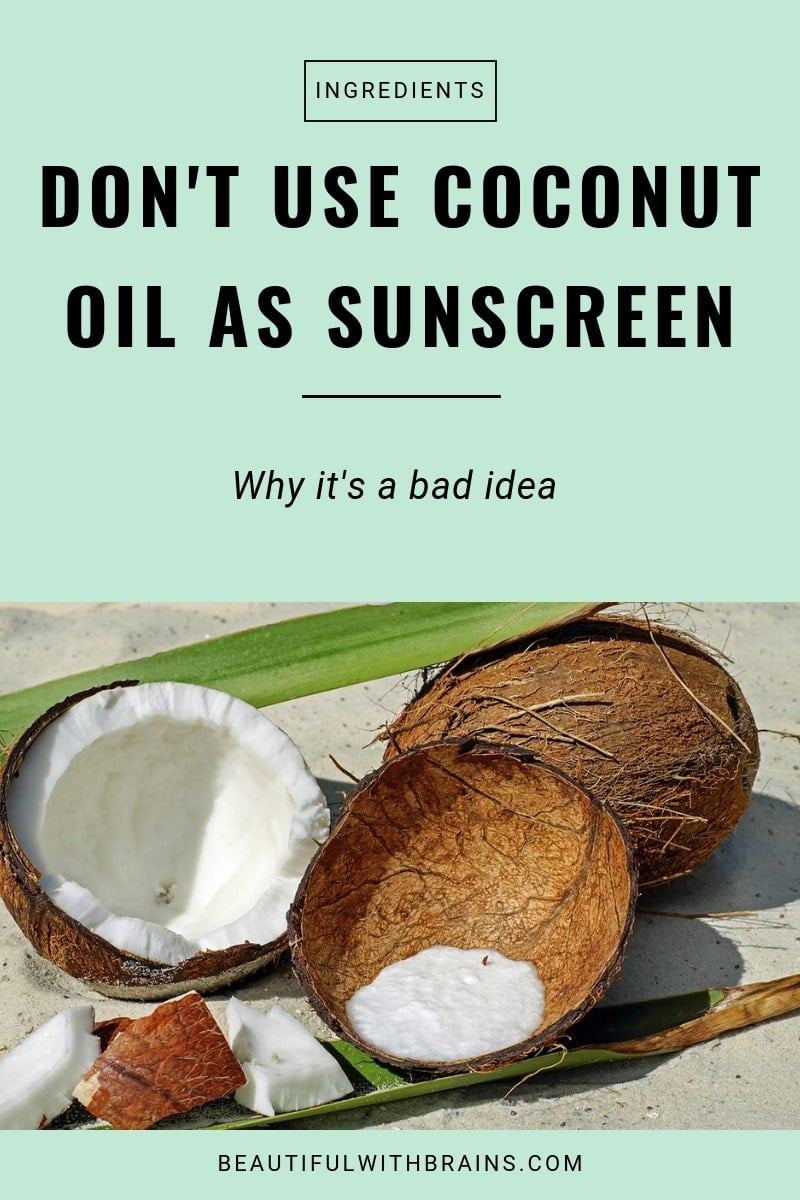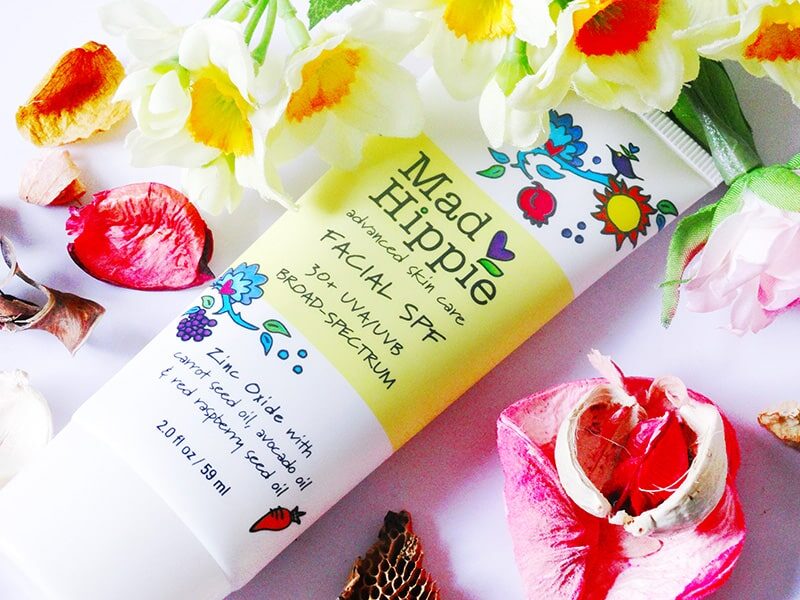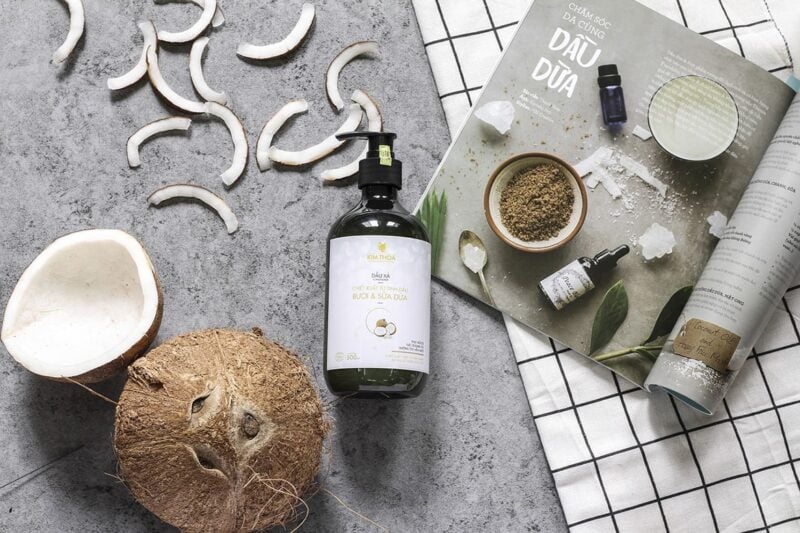
I get it. Finding a good sunscreen is a pain in the butt.
Everything seems to be too greasy, too white. or too expensive. And those synthetic UV filters! Do they really cause cancer?!
It’s so tempting to stop the search and turn to good old coconut oil instead. Word on the street is that it has in-built SPF to protect you from sunburns.
What they don’t tell you is the sun damage it leaves behind…
Here’s why using coconut oil as a sunscreen is one of the WORST skincare mistakes you can make:
Why Is Coconut Oil Considered A Good Alternative To Sunscreen?
Before sunscreen came along, people who lived in tropical climates, such as India and the Pacific island, relied on coconut oil for sun protection. They swear it helps them prevent sunburns.
It’s a nice story, isn’t it? But one science hasn’t proven yet. Without a proper study that controls every variable, how do you know coconut oil is to thank for their lack of sunburns? Maybe their diet played a part, too.
Besides, UV rays don’t just cause sunburns. They also cause wrinkles and cancer. There’s no proof coconut oil can protect you from those.
Related: The Complete Guide To Coconut Oil In Skincare
Is your sunscreen up to the job? Download your FREE “Sunscreen Audit” cheatsheet to find out if your sunscreen is both safe AND effective:
What’s The SPF Of Coconut Oil?
Let’s put coconut oil to the scientific test. If coconut oil really were a good alternative to sunscreen, it should have a SPF of least 15 (the minimum recommended by dermatologists).
That’s without taking into consideration UVA rays (remember, SPF only refers to the protection you get from UVB rays).
Does coconut oil has a SPF of 15? Nope. Its SPF is much lower.
A 2010 study shows coconut oil has a SPF of 7!
7 peeps! That’s super low. You know what this means? Coconut oil only block 80% of UVB rays!
That may seem a lot, but traditional sunscreens block 93% or more. 80% is peanuts in comparison.
Coconut oil is NOT a good alternative to sunscreen. I repeat: coconut oil is NOT a good alternative to sunscreen.
Related: Take A Number: What’s The Right SPF For You?

What Should You Do Instead?
If your skin is prone to allergies and irritations or you simply prefer to use natural products, turn to a mineral sunscreen with zinc oxide.
These sunscreen protect from the entire UV range and are so gentle, they don’t irritate even the most sensitive of skin types.
If you’re curious to know what I use, check my favourite mineral sunscreens here.
Related: 3 Reasons Why Mineral Sunscreen Is Best For Sensitive Skin

Is Coconut Oil A Substitute For Sunscreen?
No, no, no! Coconut oil has a super low SPF. It won’t protect you from UV harm. Please, do your skin a favour and use a proper sunscreen with a high SPF that protects from both UVA and UVB rays.

Wow! I had no idea people thought coconut oil would be a good substitute. And, frankly, I’m surprised it had any SPF at all.
Trisha, unfortunately, these days pretty much every synthetic ingredient is accused of being toxic or something, so a lot of people are looking for natural alternatives, thinking they are safer when, very often, they aren’t.
I agree with Trisha .. I didn’t know coconut oil has spf at all. I would think that coconut oil would be a bit greasy on the skin and would wash off quickly if you were splashing around in the water.
Monica
Monica, I haven’t tried it personally but I doubt it’d be as nice to use as a well-formulated sunscreen. And it offers very little protection, so it’s not really worth it.
Well it’s very sad to say beautiful with brains that all the information that you have given out regarding coconut oil is infact incorrect. The only bit you got right was the SPF of 7 it’s actually between 7-10 but whos counting . If something has been given an SPF that means it does provide protection against the sun’s harmful Ray’s all beit for 45mins at a time in constant sun. Coconut oil also allows the good Ray’s to penetrate through the skins surface this being the Ray’s that provide the essential vitamin D to our bodies. After your 45mins of sun you just re apply. We used it for years as kids in the 60’s it doesn’t burn the skin either so you wont go pink or red it will tan you gently and naturally. It is perfect for humans and animals and totally chemical free not like the crap you are suggesting to use which is toxic. I have evidence to back up what I have written do you?
Linda, yes I have evidence to back up what I’m saying. If you click on the links in green, you will be taken to the studies.
It doesn’t matter if the SPF is 7 or 10, it’s still below 15, the minimum recommended by dermatologist. And in the summer, that rises to SPF 30 so coconut oil is extremely inadequate.
Your claim that coconut oil lets the good rays in doesn’t make any sense. The sun emits UVA, UVB and UVC rays. UVC rays never reach us so they’re irrelevant. UVB rays give you sunburns. UVA wrinkles and dark spots. Both UVA and UVB contribute to cancer. Where are these good rays you’re talking about?
UV filters work by either reflecting UV rays away from your skin or by absorbing them and transforming them into a less damaging form of energy (heat). They don’t pick and choose which UV rays to reflect/absorb. They do the same thing to ALL UV rays. Well, most UV rays because SPF 30 still blocks around 98% UV rays and lets 2% in.
Also, a tan is always bad. A tan is your skin’s defense mechanism. It’s there to warn you you’re damaging your skin. Of course, every sunscreen will allow a subtle tan to develop as, as I’ve mentioned, a small % of UV rays still get through. But SPF 7-10 lets way too many UV rays through. The fact that you’re tanning well with it is proof it doesn’t protect you properly.
If you don’t like the sunscreens I’ve mentioned here because they’re not natural enough for you, try Sunumbra or Badger Balm. They use only a handful of ingredients, all natural. And all way safer than coconut oil for this purpose.
from what I have heard coconut oil is it better option then sunscreen
E, what is your source? Scientific studies say its SPF is around 7. How can that be better than a sunscreen with SPF 30?
My family has used Coconut oil for over 65 years, never used it in cooking just as sunscreen. our method… have a warm shower, apply coconut oil to moist skin, then on the back of neck, knees and face apply neat to skin once dry. we are a family of redheads and NONE of my family has ever got burnt from the sun. we all have outdoor jobs so exposure is 12-14 hours daily, we just end up with a golden tan within a week or so. as a vitamin suppliment we do take Vitimin “D” once a day.
we live in the UK so dont get the hot summers like the Med or Africa, but i worked out in the bahamas for 4 years and coconut oil is what the natives out there use.
i think it is a case of what suits you, i know people who use mainstream oils and creams and develop irritations and rashes as soon as the go out in the sun with the cream on, swap to coconut oil and… no rashes but a good safe tan.
one thing i learnt in the bahamas was for sunburn rub the affected skin with a solution of warm coconut oil and some native Rum, takes the sting out and heals the skin. i overheard a Pharmacy guy out there telling a brittish tourist
Garreth, thanks for sharing your experience. The thing is, though, that lack of sunburn isn’t the best way to measure the effectiveness of your sunscreen. The low SPF of coconut oil may be enough to keep burns at bay but it still allows too many UV rays to get through the skin and destroy your collagen, cellular DNA etc, resulting in premature wrinkles and dark spots. The fact you develop a tan quickly is proof that coconut oil isn’t cutting it. A tan is your skin’s natural defence mechanism against UV rays. The darker your tan is, the more your skin is damaged. 🙁
In response to Garreth, the fact that none of your family has ever burnt tells us very little. I never use any sunscreen as I am extremely lazy but I have a Mediterranean skin colour. I very rarely burn; perhaps the first time I go out at uncovered at the beginning of summer if I’m not careful but never later in the summer. My whole family is the same especially on my Mothers side. Just lucky I suppose.
Your article and comments left by others has given me some very interesting reading. I found your website by pure accident, researching natural sunscreen and how I was going to formulate my natural batch this year.
Last year, I made for the very first time my own formulated sunscreen. I was shocked and stunned by the results. I was impressed. Saying that, previously, for many years we had used mineral based natural sunscreens, but with recent studies of the use of titanium dioxide and then the confusion over either Nano or Non Nano zinc oxide, I was even more confused than ever. This is what pushed me to make my own.
However, I wanted to let you know that I used coconut oil as the base, with hemp seed oil, myrrh oil, hazelnut oil and bees wax. It worked to well. My husband is folically challenged and has a bald patch. He always gets burnt on top, along with his shoulders, especially when in the pool. Not only did he not get burnt, for the first time ever, he didn’t even have peeling. None of us did. Yes we did practice safe sun too. In the shade whenever possible, but when we are in the pool or walking around exploring, shade is not an option.
I will say that whether you choose the natural route or not, it is a mine field of confusion. Even going natural gives me cause for concern. So many natural oils and ingredients are rich in vitamin A (Retinyl palmitate). As we now know, this is bad as Vitamin A breaks down in sunlight, and forms free radicals in the presence of UVA and UVB radiation. So which natural ingredients are best. At least coconut oil does not contain vitamin A. Unfortunately the other oils such as Carrot seed oil and red raspberry, the highest natural SPF rated natural ingredients are also rich in vitamin A. So using these natural ingredients, Is it really safe?
As I said, it is a mine field. I am now researching the effects of Pomegranate oil. Once again not easy to research. In general it is written on many sites that there is no vitamin A, even though it is rich in antioxidants, whilst other claim that it is rich in vitamin A. Who do I believe?
It is not easy to know what to do for the best, but one thing is for sure, always practice safe sun.
Rita, there’s nothing wrong with using vitamin A in sunscreen. At the worst, sunlight would make vitamin A ineffective but it’s not bad forskin. You can find more about it here: http://www.sunscreensafety.info/retinyl-palmitate/
I wouldn’t formulate my sunscreen as that IS a minefield indeed but if I did, I’d add zinc oxide as it’s the best UV filter out there.
Actually, SPF 7 does not block 20% of the rays. You have your math wrong. After SPF 15, which blocks 96% of rays, SPF 30 blocks 97%, SPF 45 blocks 98%. SPF 7 blocks 80%.
Michael, thanks for spotting that! I double checked and you’re right so I edited the post. Still, it’s highly inadequate. Every derm recommends at least SPF 15, especially in the summer.
When it comes to ”science” I always wonder who sponsored the ”studies” that people so overwelmingly accept as fact just because someone labelled a ”scientist” allegedly conducted an experiment or series of. This is all based on the paradigm that a person with a particular label who went to a tertiary educational institute called a University (which is nothing compared to what Universities were in ancient times) and received a piece of paper labelled a ”degree” because he/she showed that they are highly capable of regurgitating what their lecturers threw at them, all out of something called the Syllabus (Indoctrination).
Insert here _____,_______,_______,_______,_________,_________ as many names of international sunblock manufacturers and you will get to my main point that, there is big money behind these ”studies” and the conclusions (the actual findings) belong to the sponsor whom, is able to bury OR cherry-pick details to sway the ignorant masses’ opinions Again … because an ”expert” was consulted.
Please refer to the following of Edward Bernays’ quotes, taken from one of his books (may have been ”Crystalizing Public Opinion”):
“The conscious and intelligent manipulation of the organized habits and opinions of the masses is an important element in democratic society. Those who manipulate this unseen mechanism of society constitute an invisible government which is the true ruling power of our country. …We are governed, our minds are molded, our tastes formed, our ideas suggested, largely by men we have never heard of. This is a logical result of the way in which our democratic society is organized. Vast numbers of human beings must cooperate in this manner if they are to live together as a smoothly functioning society. …In almost every act of our daily lives, whether in the sphere of politics or business, in our social conduct or our ethical thinking, we are dominated by the relatively small number of persons…who understand the mental processes and social patterns of the masses. It is they who pull the wires which control the public mind.”
― Edward L. Bernays, Propaganda
Jake, I do agree with you to a certain extent. It’s true that coverage in the media – and therefore what passes as truth – often depends on the interests of the people who own these channels. But, bringing it back to skincare, what’s the alternative? Not believe anything? Disregard science completely? I always try to look for studies funded by independent third-parties and, in the rare occasions when I can find only studies supported by manufacturers or someone else with a vested interest, I disclose it.